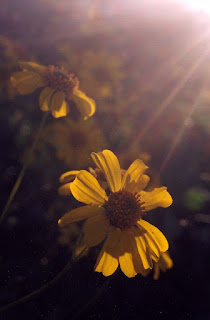I will post, with minimal editing, what I wrote on 15 March 2005, during my trip to see desert wildflowers. This was, as close as it is possible to determine, the exact date on which I became an agnostic.
“How can I begin to describe the beauty of the spring desert I beheld yesterday? And the greatest blessings came when I took the time to look closely, to slow down and immerse myself in it, to open myself to the Spirit.” While most people do not look closely at nature, out of a nation of 300 million, there must be a few million who do. “I must keep this in mind to counterbalance my cynicism, even though it is realistic and true…For the moment, I feel good not just about nature but even about the species of which I am a part.” I was reading a book, Evil and the God of Love, by John Hick. Hick “openly admitted ‘the fact of evil [which] constitutes the most serious objection there is to the Christian belief in a God of love.’ He calls it a fact; it is not, as Buddhists might say, an illusion, nor is it merely a form of human behavior. It is evil…Hick rejects an ‘inoffensive but unhelpful agnosticism,’ which provides ‘a perpetual burden of doubt’ to all believers, and has always done so, even back in the so-called Age of Faith. And Job’s answer, to be tremblingly quiet before God’s incomprehensible majesty, is not a solution…If God is intentionally involved in the world (and this may be his entire action), then we cannot expect God to see or manipulate the world from a cosmic viewpoint. Perhaps—I am speculating now—the Spirit Himself struggles to understand this? If so, then the Spirit’s answer is not an explanation but a delicate desert spring wildflower.”
I can remember where I was when I wrote this. I was eating breakfast in a restaurant in Yuma, Arizona. The trip I took out into the desert was spiritual as well as scientific.
The next day I wrote the following. To explore the wildflowers “was like walking in heaven. I also relived the beautiful part of my childhood,” when I walked amidst the spring wildflowers in the foothills of the Sierra Nevada.
But I continued reading and thinking about the problem of evil. The irrepressibly optimistic Harry Emerson Fosdick posed the opposite question to the problem of evil: “why is there so much inexplicable good in the world? Since the time of Fosdick, and of C. S. Lewis’s similar argument, altruism has been discovered. But it does not explain all of the goodness, greatness, our capacity for wisdom, love, science, and (what I now experience) biophilia.” This does not answer the problem of evil, “but what else can I do but stumble amidst flowers and rejoice while I can? I can rejoice in the flow of the Spirit, and say that this is the entirety of God’s work here and now. The Spirit also cleanses away the scabs of anger and the rot of selfishness.
“It does no good, Hick claims, to blame Satan, for now we just have to explain why God permitted Satan to exist, nor does it do any good to appeal to the finitude of creatureliness [only a theologian could come up with this], because even within our limits we could be good but are not. Sorry, John, but we will not reason out a solution. Our only response can be like a visitor to the desert spring, seeing a brief symphony of joy in a hard land, or a visitor to the desert summer, who can see nothing good but who must force himself to admit that life persists dormant.”
I
continued to think about my deteriorating health. “There will be no miracles
for me. But in the event that I survive, I will be an imperfect conduit of the
Spirit, and enjoy it. God “allowed at least one species to evolve the
intelligence to appreciate…that though most organisms simply decay, a few
re-emerge as fossils, as objects of beauty…”


No comments:
Post a Comment